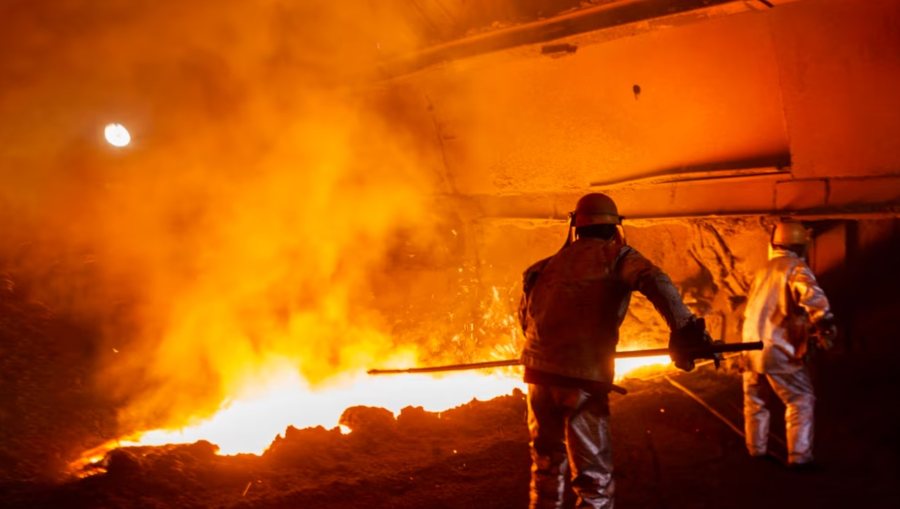
New tariffs of 25% on all steel and aluminum imports entering the US went into effect on Wednesday, ending exemptions that had been in place for a number of allied countries.
The decision affects imports from Argentina, Australia, Brazil, Britain, Canada, Japan, Mexico, South Korea and the European Union, A2 reports.
"In my judgment, these changes are necessary to reduce the significant and growing burden of imports of steel and their by-products from these countries, threatening the national security of the United States," President Donald Trump said in a statement as he announced the tariffs.
The European Union retaliated on Wednesday by announcing it would impose tariffs on $28 billion in US goods, starting in April.
"We will always remain open to negotiations. We strongly believe that in a world filled with geopolitical and economic uncertainty, it is not in our common interest to burden our economies with tariffs," European Commission President Ursula von der Leyen said in a statement.
Australian Prime Minister Anthony Albanese called Washington's decision "completely unjustified" but ruled out the possibility of imposing reciprocal tariffs.
"Tariffs and escalating trade tensions are a form of economic self-harm and a recipe for slower economic growth and higher inflation. They are paid for by consumers. That is why Australia will not impose reciprocal tariffs on the United States," Mr Albanese said on Wednesday.
Also today, Canada announced today that it will impose tariffs on $29.8 billion in U.S. goods, effective Thursday morning. The announcement was made by Canadian Finance Minister Dominic LeBlanc.
The Canadian tariffs target steel products worth $12.6 billion, aluminum products worth $3 billion, and additional US goods worth $14.2 billion.
Canada is the largest supplier of steel and aluminum to the United States.
Products affected by Canada's counter-tariffs include computers, sporting goods and cast iron products, Mr. LeBlanc said at a press conference.
Meanwhile, yesterday President Trump backed down from his decision to double tariffs on Canadian steel and aluminum, from 25 to 50%.
Last week, President Trump ignited an economic war with Canada, a traditionally staunch ally of the United States and its second-largest trading partner after Mexico, by initially announcing, then postponing for a month, 25% tariffs on all Canadian products.
President Trump said he is pressuring Canada to further stem the flow of immigrants and drugs, mainly fentanyl, entering US territory.
In response, the province of Ontario imposed a 25% tariff on the electricity it sells to 1.5 million American customers, a decision that drew the ire of President Trump, who threatened to double tariffs on Canadian steel and aluminum (from 25 to 50%).
But after talks, U.S. and Canadian officials agreed on Tuesday to reverse course. Ontario canceled its energy tariff and the Trump administration lowered steel and aluminum tariffs back to 25%.
Last week, in a reaction to Washington's tariff announcements, outgoing Canadian Prime Minister Justin Trudeau announced tariff increases on American products.
Mark Carney, Canada's incoming prime minister, said Tuesday that the goal of his next government will be to minimize the impact of tariffs on the country.
"My administration will keep the tariffs in place until Americans show respect and credibly commit to free and fair trade," Mr. Carney said in a statement.
President Trump has further fueled tensions with Canada by suggesting that the country become the 51st state of the United States.
"This would eliminate all tariffs and everything else," President Trump wrote on his social media platform "Truth Social" on Tuesday.
"Canadians' taxes will be significantly reduced, they will be more secure than ever before, militarily and generally. They will no longer be a problem, and the greatest and most powerful nation in the world will be bigger, better and stronger than ever – and Canada will be an important part of it."
President Trump said the Canadian national anthem could continue to be sung "but now representing a great, powerful country within the greatest (American) nation the world has ever seen!"
President Trump's trade war with Canada and Mexico has caused stock prices to plummet for days, affecting not only wealthy Americans but also the savings of many modest investors. / Voice of America (A2 Televizion)











